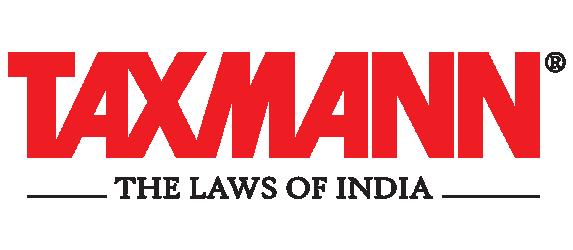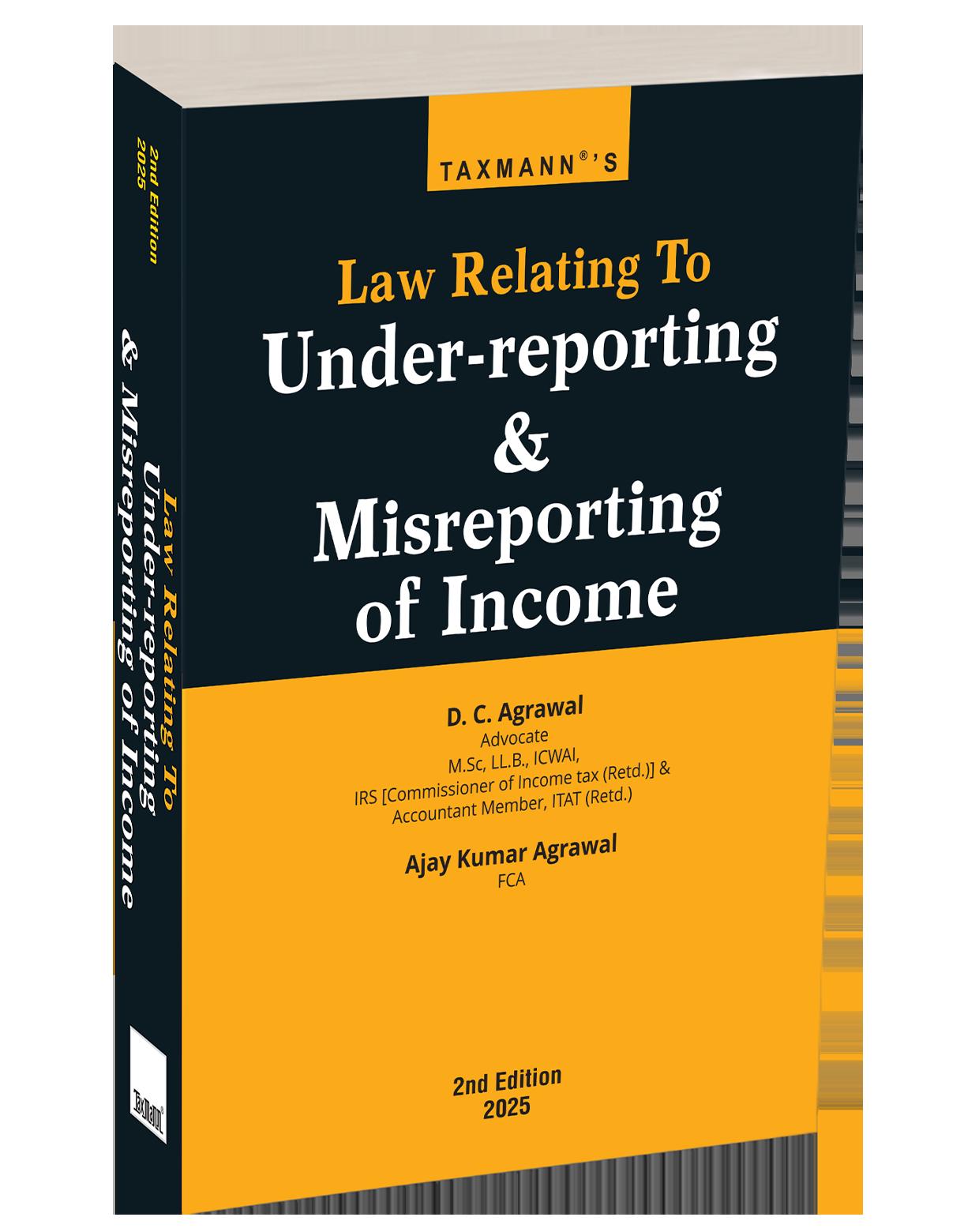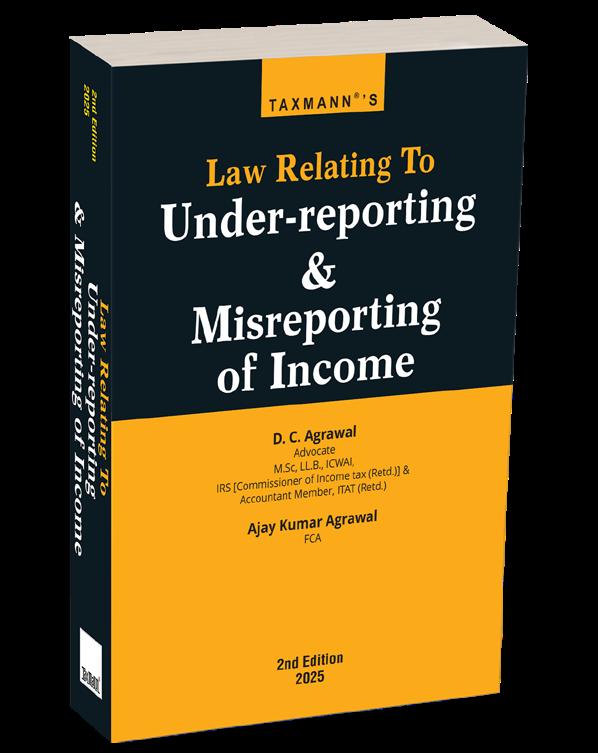Facts, books of account and evidence
6.1 Introduction
Section 270A provides for levy of penalty for under reporting of income and misreporting of income if under reporting takes place as a consequence of misreporting. The amount of penalty for under reporting is 50% of tax arising as a consequence of under reporting and amount of penalty for misreporting is 200% of the tax arising as consequence of misreporting. As per clauses (a), (b), (c), (d) and (e) of section 270A(9) the misreporting may arise as result of misrepresentation or suppression of facts, or failure to record investment in the books of account, or claim of expenditure not substantiated by any evidence, or recording of any false entry in the books of account, or failure to record a receipt in the books of account having a bearing on total income. Thus, the concept of ‘facts’, ‘books of account’ and of ‘evidence’ are relevant for arriving at the conclusion of misreporting. In this chapter we will describe in brief, the three concepts.
6.2 Fact
As per section 3* of Indian Evidence Act, 1872—
6.2-1 “Fact” means and includes
(1)anything, state of things, or relation of things, capable of being perceived by the senses.
(2) any mental condition of which any person is conscious.
Illustrations are:
(a) That there are certain objects arranged in a certain order in a certain place, is a fact.
(b) That a man heard or saw something, is a fact.
*Now section 2 of Bharatiya Sakshya Adhiniyam, 2023.
(c) That a man said certain words, is a fact.
(d) That a man holds a certain opinion, has a certain intention, acts in good faith, or fraudulently, or uses a particular word in a particular sense, or is or was at a specified time conscious of a particular sensation, is a fact.
(e) That a man has a certain reputation, is a fact.
“Relevant”. —One fact is said to be relevant to another when the one is connected with the other in any of the ways referred to in the provisions of this Act relating to the relevancy of facts.
6.2-2 “Facts in issue” means and includes
Any fact from which, either by itself or in connection with other facts, the existence, non-existence, nature, or extent of any right, liability, or disability, asserted or denied in any suit or proceeding, necessarily follows.
Explanation. — Whenever, under the provisions of the law for the time being in force relating to Civil Procedure, any Court records an issue of fact, the fact to be asserted or denied in the answer to such issue, is a fact in issue. Illustrations: A is accused of the murder of B. At his trial the following facts may be in issue: — That A caused B’s death; That A intended to cause B’s death; That A had received grave and sudden provocation from B; That A at the time of doing the act which caused B’s death, was, by reason of unsoundness of mind, incapable of knowing its nature.
6.2-3 General concept of Fact
(i) a truth known by actual experience or observation; something known to be true.
(ii) A fact is a statement that can be verified. It can be proven to be true or false through objective evidence. In other words, facts are universal.
(iii) A fact is a statement that can be tested by experimentation, observation, or research and shown to be true or untrue.
(iv) The word fact derives from the Latin factum. It was first used in English with the same meaning: “a thing done or performed”.
(v) A fact is a true datum about one or more aspects of a circumstance. Standard reference works are often used to check facts. Scientific facts are verified by repeatable careful observation or measurement by experiments or other means.
(vi) Fact may also indicate findings derived through a process of evaluation, including review of testimony, direct observation, or otherwise, as distinguishable from matters of inference or speculation.
(vii) Facts may be checked by reason, experiment, personal experience, or may be argued from authority.
6.2-4
Concept of fact under Income tax proceedings
(i) A happening or event or thing which has a physical dimension or expression, or which is verifiable.
(ii) Anything which can be perceived through senses.
For example:
(a) Transactions. They have physical expressions.
(b) Events: They have physical expressions
(
c) Statements: They are verifiable.
(d) Persons or places: They can be perceived through senses and have physical dimensions.
(
e) Articles or assets: They can be perceived through senses and have physical dimensions.
6.2-5 Facts in relation to penalties u/s 270A
Clause (a) of section 270A(9) provides a case of misreporting of income if assessee has suppressed the facts or misrepresented the facts. Fact can be transaction either not declared or partly declared or wrongly declared. Fact can be the happening of an event. It can be either not declared, or wrongly declared to the detriment of revenue. Fact can be the acquisitions of assets or of income or of incurring expenditures not declared or partly declared or wrongly declared.
6.3 Book
6.3-1
What is “Book”
Books of a businessman, in which business transactions are recorded, often consist of cash books, Journals, ledgers and various other records of accounts. A book is a written or printed work, consisting of pages glued or sewn together along one side and bound in covers. Books of account are those where all the transactions of the assessee, receipts or expenses, sales or purchases, assets and liabilities, are consecutively recorded therein, involve addition or subtraction, balances are drawn, Profit and loss account and balance-sheet are prepared therefrom.
A reference about the concept of book may be made to the decision of the Hon’ble Bombay High Court in Sheraton Apparels v. Asstt. CIT1 . Relevant extract is reproduced below for sake of ready reference:
“
20. The appellants’ case is that the diaries, which were seized, were regularly maintained in the regular course of business as regular books of account, which contained all the transactions entered into by the appellants. It reflected a true state of accounts constituting the real cash book. As such his case squarely falls within Explanation 5 to Section 271(1)(c) of the Act.
21. In order to appreciate the scope of Clause (1) to Explanation 5, it would be necessary to understand the words in which they are appearing under the said Explanation. Before concentrating on the specific meaning thereof, in the light of the legislative intent behind Clause (1), let us see, what do you mean by “books of account”. If “books of account” is considered in isolation, then, it may mean books in which merchants, traders and businessmen generally keep their accounts and are maintained for recording (a) all receipts and expenses with matters relating thereto; (b) all sales and purchases; and (c) the assets and liabilities. They are the documents and ledgers which must be prepared and kept by the business entity including the profit and loss account and the balance-sheet. In traditional terms, books mean a collection of sheets of papers bound together with the intention that such binding shall be permanent and papers used are kept collectively in one volume. It may also be assumed that it connotes the intention that it should serve as a permanent record. At the same time, the term of account, i.e., to account, means to reckon, and it is difficult to conceive of any accounting which does not involve either additions or subtractions or both of these operations of arithmetic. A book which contains successive entries of items may be a good memorandum book; but until those entries are totalled or balanced, or both, as the case may be, there is no reckoning and no accounts. A book which merely contains entries of items of which no account is made at any time, is not a “book of account” in a commercial sense.”
In Mukundram v. Dayaram2, as observed by Hon’ble Apex Court in CBI v. VC. Shukla3, the Court held that the book
“In its ordinary sense it signifies a collection of sheets of paper bound together in a manner which cannot be disturbed or altered except by tearing apart. The binding is of a kind which is not intended to the moveable in the sense of being undone and put together again. A collection of papers in a portfolio, or clip, or strung together on a piece of twine which is intended to be untied at will, would not, in ordinary English, be called a book............................... ...... ..........................I think the term “book” in section 34 aforesaid may properly’ be taken to signify, ordinarily, a collection of sheets of paper bound together with the intention that such binding shall be permanent and the papers used collectively in one volume. It is easier, however, to say, what is not a book for the purposes of section 34, and I have no hesitation in holding that unbound sheets of paper in whatever quantity, though filled up with one continuous account, are not a book of account within the purview of section 34.”
It was further observed that-
2. [AIR 1914 Nagpur 44].
3. CBI v. V.C. Shukla [1998] 1998 taxmann.com 2155 (SC).
“To account is to reckon, and I am unable to conceive any accounting which does not involve either addition or subtraction or both of these operations of arithmetic. A book which contains successive entries of items may be a good memorandum book; but until those entries are totalled or balanced, or both, as the case may be, there is no reckoning and no account. In the making of totals and striking of balances from time to time lies the chief safeguard under which books of account have been distinguished from other private records as capable of containing substantive evidence on which reliance may be placed.”
6.3-2 Book as per Section 34* of the Indian Evidence Act, 1872
Section 34* of the Indian Evidence Act, 1872, provides a definition of book . The section reads as under-
34. Entries in books of account including those maintained in an electronic form when relevant.—Entries in books of accounts including those maintained in an electronic form, regularly kept in the course of business, are relevant whenever they refer to a matter into which the Court has to inquire, but such statements shall not alone be sufficient evidence to charge any person with liability.
Illustration A sues B for Rs. 1,000, and shows entries in his account-books showing B to be indebted to him to this amount. The entries are relevant, but are not sufficient, without other evidence, to prove the debt.
The characteristics of “book” u/s 34* of IE Act are (i) Pages should be bound (ii) The binding is permanent and (iii) It should be kept in regular course of business (iv) it should have continuous page numbering.
In Dharam Chand Joshi v. Satya Narayan Bazaz4 it was held that ordinarily collection of sheets of papers bound together with the intention that such binding shall be permanent, and the papers used collectively in one volume can be said to be a book of account under section 34*. Unbound sheets of paper, in whatever quantity, though filed in with one continuous account, are not a book of account within the meaning of Section 34* of the Act.
In Ishwar Dass Jain v. Sohan Lal5 it was observed that, the books should indeed be account books i.e. in original and they are kept in the “regular course of business”. Such sanctity cannot be attached to private extracts of alleged account books where the original accounts are not filed into Court. From the extracts, it cannot be discovered whether the accounts are kept in the regular course of business, or if there are any interpolations, or whether the interpolations are in a different ink, or whether the accounts are in the form of a book with continuous page-numbering.
A book of account as per Black’s law dictionary means: “a detailed statement in the nature of debits and credits between persons and account of records of
4. AIR 1993 Gau. 35.
5. AIR 2000 SC 426.
*Now section 28 of Bharatiya Sakshya Adhiniyam, 2023.
debits and credits kept in a book; a book in which a detailed history of business transaction is entered; a record of goods sold or services rendered; statement in detail of the transactions between the parties.” The books of account also mean books in which merchants, traders and businessmen generally keep their accounts; entries made in the regular course of business; serialised, continuous and permanent memorials of the business affairs.
As per Advanced Law Lexicon 3rd edition 2005-page No. 576 by P. Ramanatha Aiyar, the scope of books of accounts is described as under—
(i) Books in which merchants, businessmen. and traders generally keep their accounts. “Books of account” mean such books of account as are usual in the business, and do not extend to “letters, cheques, and vouchers from which books of account can be made up”.
(ii) Unbound sheets of paper in whatever in quantity, though filled up with one continuous account are not a book of account A book which merely contains entries of items of which no account is made, is not a book of account. The term “book of account” signifies a collection of sheets of papers bound together with the intention that such binding shall be permanent, and the paper used collectively in one volume.
(iii) If the word account is to be given wider meaning to include a record of financial transactions reckoned, a book containing a statement of monetary transaction would attract the definition of book of the account under section 34* of the Act. CBI v. V.C. Shukla, (1998) 3 SCC 410, para 23 [Indian Evidence Act, 1872 (1 of 1872), section 34*]
(
iv) Company’s books in which business transactions are recorded, often consisting of journals, ledgers, and various other records of accounts. They are normally held to be legal documents and should indicate the financial position of the business at any time. (International Accounting Business Term)
12A)
(
i) Section 2 clause (12A) defines “books or books of account” includes ledgers, daybooks, cash books, account-books and other books, whether kept in the written form or as print-outs of data stored in a floppy, disc, tape or any other form of electro-magnetic data storage device”; The clause (12A) provides that the books, or books of account, includes ledgers, daybooks, cash books, account-books and other books, whether kept in written form, or as print-outs of the data stored in a floppy, disc, tape or any other form of electromagnetic data storage device6.
6. Saurashtra Ball Pen (P.) Ltd v. Dy. CIT [2008] 24 SOT 556 (Mumbai - Trib).
*Now section 28 of Bharatiya Sakshya Adhiniyam, 2023.
(
The above definition appears to have been framed by the Legislature keeping in view the development of computer technology. If the newly inserted definition of books of account inserted in the Income-tax Act is examined in contrast to the definition given under Section 34 of the Evidence Act, it will be clear that the stringent requirements of Section 34 are not to be found in the said definition. Obviously, for the simple reason that the purpose of both the legislations are different7. Pucca books of cash, sales and purchase registers are books of account as defined under Section 2(12A) of the Act8.
ii) Section 44AA requires for Maintenance of accounts by certain persons carrying on profession or business as under: ‘44AA. (1) Every person carrying on legal, medical, engineering or architectural profession or the profession of accountancy or technical consultancy or interior decoration or any other profession as is notified by the Board in the Official Gazette shall keep and maintain such books of account and other documents as may enable the Assessing Officer to compute his total income in accordance with the provisions of this Act.
(2) Every person carrying on business or profession not being a profession referred to in sub-section (1) shall,—
(i) if his income from business or profession exceeds one lakh twenty thousand rupees or his total sales, turnover or gross receipts, as the case may be, in business or profession exceed or exceeds ten lakh rupees in any one of the three years immediately preceding the previous year; or
(ii) where the business or profession is newly set up in any previous year, if his income from business or profession is likely to exceed one lakh twenty thousand rupees or his total sales, turnover or gross receipts, as the case may be, in business or profession are or is likely to exceed ten lakh rupees, during such previous year; or
(iii) where the profits and gains from the business are deemed to be the profits and gains of the assessee under section 44AE or section 44BB or section 44BBB, as the case may be, and the assessee has claimed his income to be lower than the profits or gains so deemed to be the profits and gains of his business, as the case may be, during such previous year; or
(iv) where the provisions of sub-section (4) of section 44AD are applicable in his case and his income exceeds the maximum amount, which is not chargeable to income-tax in any previous year,
7. Amitabh Bansal v. ITO [2019] 102 taxmann.com 229 (Delhi - Trib.).
8. CIT v. S.C. Naregal [2011] 16 taxmann.com 420 (Karnataka).
keep and maintain such books of account and other documents as may enable the Assessing Officer to compute his total income in accordance with the provisions of this Act:
Provided that in the case of a person being an individual or a Hindu undivided family, the provisions of clause (i) and clause (ii) shall have effect, as if for the words “one lakh twenty thousand rupees”, the words “two lakh fifty thousand rupees” had been substituted :
Provided further that in the case of a person being an individual or a Hindu undivided family, the provisions of clause (i) and clause (ii) shall have effect, as if for the words “ten lakh rupees”, the words “twenty-five lakh rupees” had been substituted.
(3) The Board may, having regard to the nature of the business or profession carried on by any class of persons, prescribe, by rules, the books of account and other documents (including inventories, wherever necessary) to be kept and maintained under sub-section (1) or sub-section (2), the particulars to be contained therein and the form and the manner in which and the place at which they shall be kept and maintained.
(4) Without prejudice to the provisions of sub-section (3), the Board may prescribe, by rules, the period for which the books of account and other documents to be kept and maintained under sub-section (1) or sub-section (2) shall be retained.’
(iii) An overview of the provision: Section 44AA of Income-tax Act provides the requirements for maintaining books of account and other documents for certain professions and businesses. An overview of the provision is as under:
(i) Requirement for Certain Professions [Sub-section (1)]:
Individuals carrying on specified professions (legal, medical, engineering, architectural, accountancy, technical consultancy, interior decoration, or any other profession notified by the Board) must keep and maintain books of account and other documents that allow the Assessing Officer to compute their total income as per the Act’s provisions.
(ii) Requirement for Other Businesses and Professions [Subsection (2)]: This sub section applies to those not covered in sub-section (1), with conditions:
(i) If the income from business or profession exceeds INR 1,20,000, or total sales, turnover, or gross receipts exceed INR 10 lakh in any of the three years preceding the previous year.
(ii) For newly set up businesses or professions if the income or sales/turnover is likely to exceed the specified limits in the previous year.
(iii) If profits and gains are deemed under section 44AE, 44BB or 44BBB, and the income claimed is lower than these deemed profits and gains.
(iv) Where sub-section (4) of section 44AD applies, and the income exceeds the maximum amount not chargeable to income-tax.
The provisions of clauses (i) and (ii) are modified for individuals and Hindu Undivided Families (HUFs), increasing the thresholds to INR 2,50,000 for income and INR 25 lakh for sales/turnover.
(iii) Prescription of Books and Documents by the Board [Subsection (3)]:
The Board may prescribe the types of books of account and other documents to be kept and maintained, including details like the particulars contained, form, manner, and place of maintenance.
(iv) Retention Period for Records [Sub-section (4)]:
The Board may also set rules for how long these books and documents should be retained.
Section 44AA essentially mandates the maintenance of proper financial records for individuals and entities engaged in certain professions and businesses. This requirement ensures transparency and facilitates accurate income computation for tax purposes. The section provides flexibility for the Board to prescribe specific requirements and retention periods according to the nature of different businesses or professions.
(iv) Further understanding of the provision: Under sub-section (3) of section 44AA, the Board has prescribed, u/r 6F, the following books of account to be maintained by persons—
(1) Cash Book
(2) Journal
(3) Ledger
(4) Carbon copies of sale bills, exceeding ` 25/-, which should be serially numbered.
(5) Bills of expenditure incurred, exceeding ` 50/-, along with signed payment vouchers:
Provided that the requirements as to the preparation and signing of payment vouchers shall not apply in a case where the cash book
maintained by the person contains adequate particulars in respect of the expenditure incurred by him.
Further as per sub-section (3) of section 44AA, under rule 6F, the books of account should be maintained by the person at the place where he is carrying on the business or profession or, where the business or profession is carried on in more places than one, at the principal place of his business or profession.
Where the person keeps and maintains separate books of account in respect of each place where the profession is carried on, such books of account and other documents may be kept and maintained at the respective places at which the profession is carried on.
For companies, the books of account are prescribed under the Companies Act. Furthers, the Institute of Chartered Accountants of India has prescribed various Accounting Standards and Guidelines that are required to be followed by the business entities.
Under section 44AA or Rule 6F, the legislature has not included the bank passbook as part of books of account or accounting record. If the taxpayer fails to maintain accounting records as per the requirements of Section 44AA, a penalty may be levied under section 271A. There is no reported case for levying penalty u/s 271A for failure to maintain bank passbook.
Section 68 refers to the expression “books of the assessee, maintained for any previous year” and not “books of account”. The expression “maintained” signifies that the books are regularly written and contain record of financial transactions, such as sale and purchase, acquisition and disposal of capital assets, borrowing and payment of money and of profit and loss in the previous year. However, Section 68 does not restrict the maintenance of books only for business purposes, it could be for the personal purposes also, but would necessarily contain record of financial transactions, irrespective of whether it is for business purposes or personal purposes. Therefore, a memorandum in the shape of a book which contains the entries of financial transactions would fall within the expression “books of an assessee” within the meaning of Section 68.
While section 68 uses the expression “books” maintained for any previous year, section 69/69A/69B use the expression “books of account”, if any, maintained for any source of income. While for the purposes of section 68, even personal memorandum, diary, notebook which may not contain business transaction will still be a book and AO can make addition, if credit
entries recorded therein are not satisfactorily explained. What is relevant is that such books should be books of the assessee himself and not of any other assessee. Thus, these books for the purposes of section 68 need not necessarily be books of account maintained for the purposes of business. On the other hand, books of account would be those books where accounts are maintained and closing balances are drawn and would include cash book ledger and daybook. They generally relate to record of business transactions and should meet the definition provided in section 2(12A). The scope of word “books” used in section 68 are comparatively wide and would include books of account. The distinction is further clear from the additional expression used in sections 69, 69A and 69B that “maintained for any source of income”. In other words, only those books are books of account (i) which contain account of transactions (ii) which generate income from any source and (iii) where totals are done, and balances are drawn. Thus, personal books and memorandum which do not contain account of generation of income will not be books of account for the purposes of section 69/69A/69B. Further, it is only books of account, required to be maintained u/s 44AA, which are subjected to audit u/s 44AB and not any personal books of the assessee (even though addition u/s 68 can be made on the basis of credit entries in such books). Penalty u/s 271B is leviable for not getting books of account (required to be maintained u/s 44AA) audited as required u/s 44AB and not for getting personal “books” audited.
6.3.7-1 Rule 6F(5) reads as under:—
(5) The books of account and other documents specified in sub-rule (2) and sub-rule (3) shall be kept and maintained for a period of six years from the end of the relevant assessment year:
Provided that where the assessment in relation to any assessment year has been reopened under section 147 of the Act within the period specified in section 149 of the Act, all the books of account and other documents which were kept and maintained at the time of reopening of the assessment shall continue to be so kept and maintained till the assessment so reopened has been completed.
6.3.7-2 Rule 6F(2) provides the kind/description of books required to be maintained by an assessee carrying on a profession described in Rule 6F(1). Rule 6F(3) provides the description of the books of account required to be kept by medical professional. Rule 6F(1) requires every person carrying on legal, medical, engineering or architectural profession or the profession of accountancy or technical consultancy or interior decoration, or authorised representative of film artist shall keep and maintain the books of account and other documents specified in sub-rule (2).
Rs. 1395/-
LAW RELATING TO UNDER-REPORTING & MISREPORTING OF INCOME
AUTHOR : D.C. AGRAWAL, AJAY KUMAR AGRAWAL
PUBLISHER : TAXMANN
DATE OF PUBLICATION : MARCH 2025
EDITION : 2ND EDITION 2025
ISBN NO : 9789364554862
NO. OF PAGES : 584
BINDING TYPE : PAPERBACK
DESCRIPTION
This book examines the legal framework for penalties for under-reported and misreported income under the Indian Income Tax regime, particularly focusing on Section 270A. It takes readers through historical penalty provisions (Section 271(1) (c)), clarifies key concepts (e.g., ‘under-reporting,’ ‘misreporting,’ ‘mens rea’), and includes practical sample replies to penalty notices. This book is intended for the following audience:
• Tax Practitioners & Chartered Accountants
• Lawyers & Advocates
• Corporate Finance Professionals
• Students & Academicians
The Present Publication is the 2nd Edition | 2025, updated till 30th March 2025. This book is authored by D.C. Agrawal and Ajay Kumar Agrawal, with the following noteworthy features:
• [Complete Coverage of Penalty Provisions] Commentary on older provisions under Section 271(1)(c), analysis of Section 270A, and related sections (270AA, 271AAC, 271AAB, 273B, 274)
• [Practical Draft Responses] Over thirty illustrative chapters for drafting replies to various penalty scenarios
• [Illustrative Case Studies & Examples] Explains how courts interpret underreporting, misreporting, and burden of proof
• [Guidance on Burden of Proof & Evidence] Comprehensive discussion on how Indian Evidence Act principles apply
• [Clarification on Mens Rea] Dedicated chapters on ‘guilty mind’ and its relevance under Section 270A
• [Latest Amendments & Circulars] Incorporates changes introduced by the Finance Act 2025, with relevant CBDT notifications

















